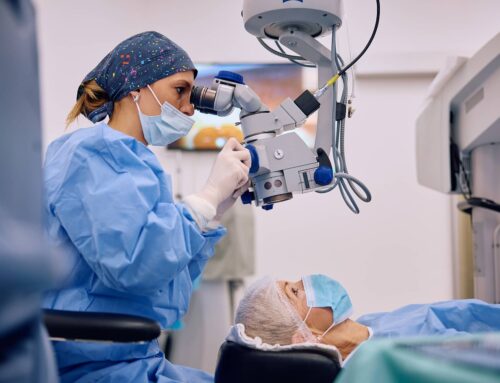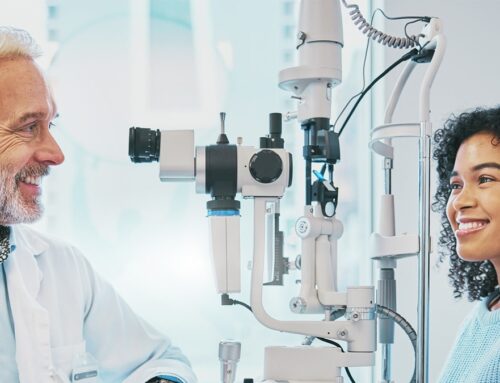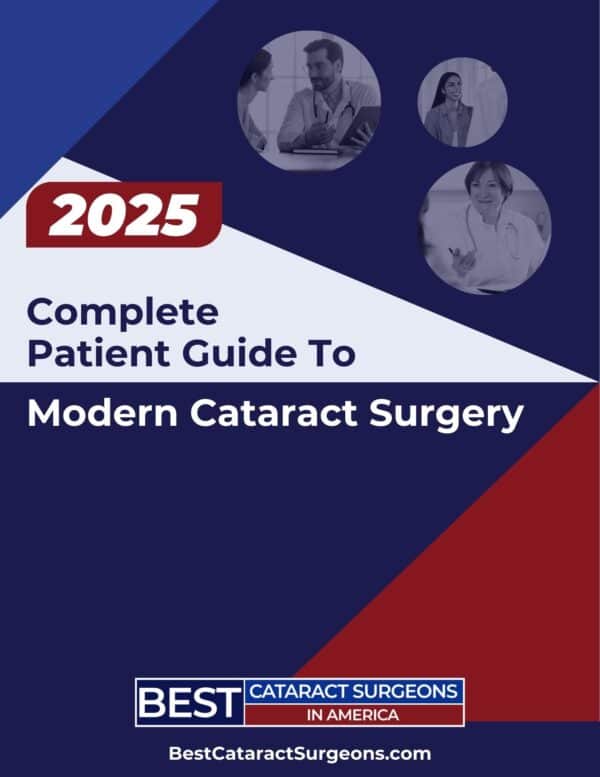Have you recently undergone cataract surgery, and ask yourself, “Can cataract surgery be redone?” This is a natural and important question as you navigate post-surgery vision care. While cataract removal itself is permanent and not reversible, there are situations when additional treatments may be necessary to address lingering or new conditions that pop up later on.
To help you maintain the clearest vision possible, let’s dive in and look at the potential reasons for post-cataract surgery vision changes and their available treatments, as well as what risks and recovery outcomes you can expect along the way.
What Is Cataract Surgery and How Successful Is It?
Cataract surgery involves removing your eye’s cloudy, natural lens and replacing it with an artificial lens (IOL). The answer to the question of whether cataract surgery can be redone is no, as your natural lens cannot be put back or regrown. However, with a success rate of over 98%, most patients report high satisfaction rates, with many achieving 20/20 vision or better.
Why Might Additional Procedures Be Necessary?
Although rare, it’s possible for you to experience vision problems after cataract surgery. While you can’t have your cataract surgery redone, other procedures can address common conditions that pop up, like:
- Posterior Capsule Opacification (PCO). Also known as a “secondary cataract” this can develop in about 20% of patients within 3-5 years after cataract surgery. The back portion of the lens capsule becomes cloudy, leading to blurry vision and glare reminiscent of a traditional cataract. With timely identification, YAG Laser Capsulotomy can create a small opening in the cloudy capsule, restoring your clear vision without extensive recovery time.
- Intraocular Lens (IOL) Issues. In less than 1% of cases, incorrect positioning of the artificial lens during surgery, damage to the IOL, or dissatisfaction with the IOL type can happen. The solutions include repositioning the existing IOL to fit your eye’s anatomy better, exchanging the IOL lens with a new one, or adding a second lens in front of the original to handle specific refractive errors (coined piggybacking).
- Residual Refractive Error or Astigmatism. It’s possible for some patients to still need vision correction after surgery (10-15% of cases), due to a residual refractive error or the presence of astigmatism. If you’re in this boat, this doesn’t mean that your cataract surgery can be redone, but rather that you may need laser vision correction (LASIK), limbal relaxing incisions for astigmatism, or prescription eyewear.
- Lens Calcification. Very rarely, calcium can build up on the artificial lens causing clouding. When this happens, an IOL exchange is necessary if the clouding becomes severe and impacts vision significantly.
If you notice lingering visual issues (even years later), it’s best to schedule a follow-up for additional evaluation to get an accurate diagnosis and a list of possible treatments that you’re a candidate for.
Patient Scenario – Sarah’s Experience.
Sarah, a 65-year-old retiree, had successful cataract surgery in both eyes. Two years later, she noticed her vision becoming cloudy again. Worried that her cataracts had returned, she asked her doctor, “Can cataract surgery be redone?” Her ophthalmologist explained that she had developed PCO and that a simple laser procedure could clear her vision.
What Are The Risks Of Extra Treatments?
As with all surgical treatments, there’s always some additional risk that you should talk about with your
eye care professional before proceeding with treatment. You’ll be informed about all risks, such as:
Infection rates (rare, occurs in less than 0.1% of cases), changes in eye pressure, lens fragments, fluid buildup, retinal detachment (about 1 in 3,000 cases), etc.
Recovery and Outcomes
Your recovery depends on what additional treatment you’re undergoing.
- With a YAG Laser Capsulotomy recovery is minimal, allowing a return to activities the same-day.
- If it’s an IOL Exchange or Repositioning, then recovery is 4-6 weeks.
- If you’re undergoing Laser Vision Correction, then it’s a few days to a few weeks.
Enjoy Your Life With Clearer Vision
While cataract surgery itself cannot be redone, modern eye care offers numerous safe and effective solutions for any vision issues that may arise afterward. If you’re concerned about changes in your vision following cataract surgery, don’t hesitate to take action. Use our Find a Surgeon Directory to connect with a top cataract specialist in your area, and explore our Cataract Resources to learn more about your options. Your journey to optimal vision doesn’t end with cataract surgery – let us help you maintain clear sight for years to come.










